The software, devised by researchers from Imperial College London, Technical University of Munich, and Edinburgh University, addresses two of the most difficult challenges in assessing stroke patients – identifying the onset time of the stroke and whether the damage can be reversed.
The AI algorithm was developed in partnership with Professor Daniel Rueckert (Imperial College London and Technical University of Munich) and Dr Grant Mair of Edinburgh University.
The model was trained on a dataset of 800 brain scans where the stroke time was known. As well as automatically extracting the relevant area from the brain scan, the algorithm reads and analyses the identified lesions, producing a time estimate.
When it was tested on almost 2,000 patients, researchers found the AI software was twice as accurate as using a standard visual method. They believe this is because it includes additional features from the scans, such as texture, and accounts for variations within the lesion and background. It wasn't only good at estimating the chronological time of the stroke, but also the biological age of the lesions, by which is meant whether they may be reversible.
Dr Paul Bentley at Imperial's Department of Brain Sciences, who led the study, said: ‘For the majority of strokes caused by a blood clot, if a patient is within 4.5 hours of the stroke happening, he or she is eligible for both medical and surgical treatments. Up to six-hours, the patient is also eligible for a surgical treatment, but after this time point, deciding whether these treatments might be beneficial becomes tricky, as more cases become irreversible. So it's essential for doctors to know both the initial onset time, as well as whether a stroke could be reversed.'
Lead author Dr Adam Marcus added: ‘We estimate that up to 50% more stroke patients could be treated appropriately with treatments because of our method. We aim to deploy our software in the NHS, possibly by integrating with existing AI-analytic software that is already in use in hospital trusts.'



